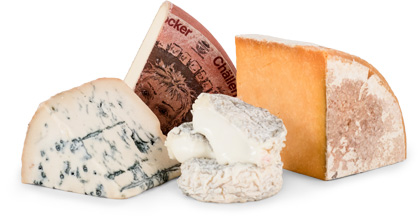Sbrinz is considered by many to be the oldest cheese in Europe. In fact, during the thirteenth century, Sbrinz was transported from Lucerne, Switzerland, to Domodossola, Italy, by way of mules, which brought back Italian wine in return. On this trade route, one will find Alp Chüeneren, Wiesenberg, at an altitude 4,600 feet, where cheesemaker Andreas Gut produces the Sbrinz Alpage we bring you this month.
The recipe for Sbrinz has been preserved for centuries, and today there are only 42 dairies in the world making this AOP protected cheese. The rind is adorned with a lovely ring of mountain flowers, paying homage to the summer pasture diet of the cows. The addition of the word “Alpage” signifies a Sbrinz made at a very high altitude in the Alps. Here, cows are transported to graze on the summer’s flowery, grassy pastures, and only the summer’s milk is used to make cheese designated as Alpage.
A great deal of time, tradition, and love goes into making each wheel of Sbrinz. Typically, Sbrinz is aged for a minimum of 18 months before it is released to the market, but the cheese doesn’t reach its apogee until it’s aged a minimum of 30 months. This slow aging process results in a complex, full-flavored, and extra-hard cheese. The Sbrinz Alpage we’ve selected for our club is not released until it reaches 36 months of aging, and only after being subject to an intense selection process in which only the very best wheels are chosen.
Sbrinz Alpage AOP is a veritable explosion on the palate, with savory umami and rich, buttery flavors, with a lengthy finish. It possesses a dense, crumbly, chewy texture, and is loaded with flavor crystals, similar to Italy’s parmigiano reggiano. Therefore, it is often used in place of parmesan. Sbrinz cut from the whole wheel with a cheese knife into pieces called möckli may be added to a cheese plate or packed as a snack. The very fragrant, herbal Sbrinz is a flavor booster in many recipes and can be used in most any instance where one would use parmigiano reggiano, such as a topping for pastas, pizzas, and salads. Pair this cheese with sparkling wines, fruity reds like barbera and Beaujolais (Gamay), or off-dry whites with a balance of acidity and sweetness, such as gewürztraminer, pinot gris, or riesling.

Experience International Variety
You might receive a Gaperon, originating in France during the 14th Century, an
authentic Lancashire by Ruth Kirkham, and an Italian Taleggio matured in the
caves of Valsassina…all in one shipment!

